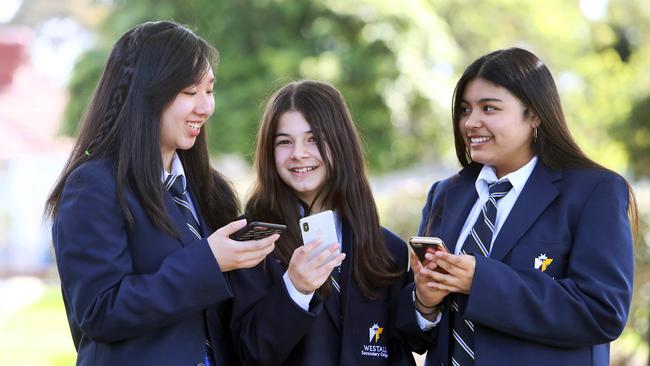Teens struggling to be ‘normal’ in a hyper-digital world
Young women are struggling with the almost overwhelming complexity of navigating life on and offline.

These are the post-feminists, post-MeToo, post-TimesUp, looking to define their version of womanhood in the new hyper-digital world.
And they are struggling with the almost overwhelming complexity of navigating life on and offline.
They know their carefully curated digital identity is far from reality but want to create the perfect selfie anyway.
They desire online connection but are wary of revealing their true selves to their peers.
They are routinely exposed to online content that parents couldn’t imagine, and look to Kardashian-esque influencers to set the standard for beauty, behaviour and social norms.
This snapshot of life for female teenagers is drawn from the contributions of some 8000 girls around the world who were asked to share their hopes and fears by Melbourne digital platform and education technology company GirledWorld.
The content will next year become a book entitled You Are Not Your Face, but its main topics are being debated among some 200 high school students on Thursday at the Melbourne Writers Festival schools program.
“We had girls contribute from Australia, India, Brazil, China, France, Korea and the US among others, and so many common themes emerged. I have to say it was a pretty dystopian collective world view,” GirledWorld co-founder Madeleine Grummet said. “So many girls wrote in to share personal accounts of social isolation, self-harm, depression, sexting, cyber-bullying, digital addiction, over-sexualisation — they were all writ large in the submissions we received.
“Interestingly, they found ‘feminism’ to be a dirty word. They rejected MeToo and TimesUp as not their thing, and saw modern feminism as irrelevant, confrontational and divisive, aflame with accusations rather than based on equality and reconciliation. They had their own version of post-feminist womanhood.
“So many were struggling with what it meant to be ‘normal’, in behaviour and looks, as they checked out the feeds of influencers on Instagram, Snapchat or Weibo.
“What was clear was this increasing pressure young girls felt to be perfect due to the social media-fuelled overemphasis on outer appearance, which was creating mental health problems.”
Westall Secondary College student Zoi Spiliopoulou, 13, is heading to Thursday’s debate with more than 100 schoolmates.
She couldn’t remember the last time she watched TV, as her phone had everything she needed. “At times girls can get all ‘I’ve got to keep the perfect image online’, and they don’t feel comfortable showing what their insecurities are,” she said.
This was not a judgment, she said, as “when you use social media, you want to capture the happy moments. When I look back, I don’t want to see when I wasn’t so happy.”
Her schoolmate Monineath Seang, 14, said she didn’t have an online persona different from her offline one: “I balance (social media) with my everyday activities, and try and use it only with the people I’m close to.”
Ms Grummet said a concerning level of naivety remained about responsible digital usage among the teenagers, despite them being submerged in the digital realm with all its access to unfiltered information.
“They really haven’t come to grips with the realities of their passive digital footprint, and just how much of their lives they have exposed which can never be erased,” she said.




To join the conversation, please log in. Don't have an account? Register
Join the conversation, you are commenting as Logout